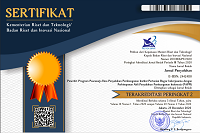Efek Strategi Komunikasi Pemasaran Personal Selling PT Agricon Pada Petani Padi di Kabupaten Karawang
Abstract
The objective of this research was to determine the personal selling of marketing communication strategy which was conducted by PT Agricon and to examine the factors related to the effects of it. This research applies simple random sampling which was conducted by using quantitative methods and supported by qualitative approach. The result showed that there were several activities which were implemented by the formulators of personal selling in the Village Rawagempol, such as demo plots, farmers meeting, field trip, and one day promo. Factors that are correlates positively to the tendency of farmer to buy the products are formulator communication skill in attracting farmer attention, the ability to explain the advantages of the product, the ability to use props well, farmer communication skill in being critical to formulator, and the ability of farmer to deliver attention and listen to the formulator. On farmer characteristics side, there were no factors that correlate to the tendency of farmers to buy the products.
Keywords: effect communication, marketing communication, personal selling
Downloads
Authors who publish with this journal agree to the following terms:
- Authors retain copyright and grant the journal right of first publication with the work simultaneously licensed under a

This work is licensed under a Creative Commons Attribution 4.0 International License that allows others to share the work with an acknowledgement of the work's authorship and initial publication in this journal. - Authors are able to enter into separate, additional contractual arrangements for the non-exclusive distribution of the journal's published version of the work (e.g., post it to an institutional repository or publish it in a book), with an acknowledgement of its initial publication in this journal.
- Authors are permitted and encouraged to post their work online (e.g., in institutional repositories or on their website) prior to and during the submission process, as it can lead to productive exchanges, as well as earlier and greater citation of published work (See The Effect of Open Access).















